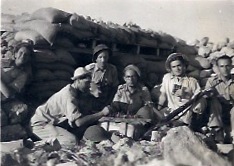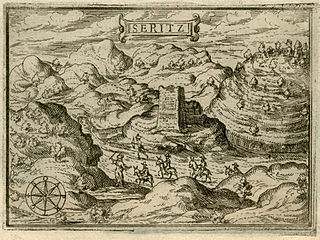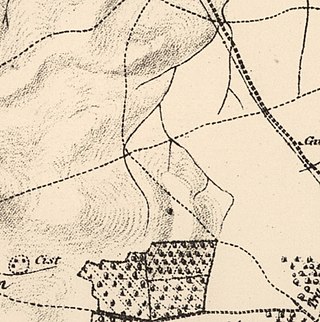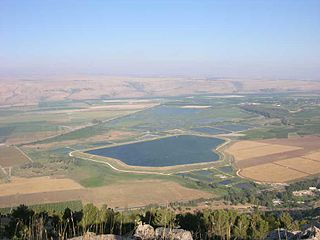
Khirbat Iribbin or Khurbet 'Arubbin, was a Palestinian Arab village in the Upper Galilee, located 23 km (14 mi) northeast of the city of Acre. In 1945, it had a built-up land area of over 2,000 dunums and a population of 360 Arab Muslims.

Killings and massacres during the 1948 Palestine war resulted in the deaths of hundreds of civilians and unarmed soldiers.

Operation Nachshon was a military operation of the Haganah during the 1947–1948 civil war in Mandatory Palestine and part of Plan Dalet. Its objective was to open the Tel Aviv – Jerusalem road blockaded by Palestinian Arabs, and furnish arms and supplies to the besieged Jewish community of Jerusalem. The operation was also known as "The operation to take control of the Jerusalem road," following which participating units later broke off to form the Harel Brigade. Following attempts to take control of the road to Jerusalem were unsuccessful and led to the construction of a makeshift bypass—Burma Road.

Operation Yoav was an Israeli military operation carried out from 15–22 October 1948 in the Negev Desert, during the 1948 Arab–Israeli War. Its goal was to drive a wedge between the Egyptian forces along the coast and the Beersheba–Hebron–Jerusalem road, and ultimately to conquer the whole Negev. Operation Yoav was headed by the Southern Front commander Yigal Allon. The operation was named after Yitzhak Dubno, codenamed "Yoav" by his commanders in the Palmach. Dubno, a senior Palmach officer, was charged with planning and leading the defense of the kibbutzim Negba and Yad Mordechai. Dubno was killed in an air raid on Kibbutz Negba shortly after Egyptian forces began their offensive on Israel's southern front.
Plan Dalet was a Zionist military plan executed in the civil war phase of the 1948 Palestine war for the conquest of territory in Mandatory Palestine in preparation for the establishment of a Jewish state. The plan was requested by the Jewish Agency leader and later first prime minister of Israel David Ben-Gurion, and developed by the Haganah and finalized on March 10, 1948. Historians describe Plan Dalet, in which Zionist forces shifted to an offensive strategy, as the beginning of a new phase in the 1948 Palestine war.

Saris was a Palestinian Arab village that was depopulated during the major offensive launched by the Haganah on 16 April 1948. Called Operation Nachshon, and launched before the British had left Palestine, its objective was to capture villages between Jerusalem and the coastal plain, in order to break to siege of the Jews of Jerusalem.

The Institute for Palestine Studies (IPS) is the oldest independent nonprofit public service research institute in the Arab world. It was established and incorporated in Beirut, Lebanon, in 1963 and has since served as a model for other such institutes in the region. It is the only institute in the world solely concerned with analyzing and documenting Palestinian affairs and the Arab–Israeli conflict. It also publishes scholarly journals and has published over 600 books, monographs, and documentary collections in English, Arabic and French—as well as its renowned quarterly academic journals: Journal of Palestine Studies, Jerusalem Quarterly, and Majallat al-Dirasat al-Filistiniyyah. IPS's Library in Beirut is the largest in the Arab world specializing in Palestinian affairs, the Arab–Israeli conflict, and Judaica.

Rashid Ismail Khalidi is a Palestinian-American historian of the Middle East and the Edward Said Professor of Modern Arab Studies at Columbia University. He served as editor of the Journal of Palestine Studies from 2002 until 2020, when he became co-editor with Sherene Seikaly.
Hasib Sabbagh was a Palestinian businessman, activist, and philanthropist.

Arab al-'Arida, is a depopulated former Palestinian Arab village and 6 kilometers (3.7 mi) south of the city of Beit She'an.

Al-Jammama was a Palestinian Arab village located in the Negev desert 30 km north west of the city of Beersheba. Its settled population was recorded as six in the 1931 census.

In February 1948, Yigal Allon, commander of the Palmach in the north, ordered an attack on Sa'sa'. The order was given to Moshe Kelman, the deputy commander of Third Battalion. The order read: "You have to blow up twenty houses and kill as many warriors as possible". According to Ilan Pappé, "warriors" should be read as "villagers" to properly understand the order. Khalidi, referencing "The History of the Haganah" by Ben-Zion Dinur, say they referred to the massacre as "one of the most daring raids into enemy territory."

Sajad was a Palestinian village in the Ramle Subdistrict. It was located sixteen kilometers south of Ramla. Sajad was established in the late 19th century near a local train station. It was depopulated during the 1948 Arab–Israeli war.
Nur ad-Din Masalha commonly known in English as Nur Masalha is a Palestinian writer, historian, and academic.

Abu al-Fadl was a Palestinian village in the Ramle Subdistrict, about 4 km (2.5 mi) northwest of Ramla in, what was until 1948, Mandatory Palestine. The village was also known as al-Satariyya. In 1945/44, the village had a population of 510.

Al-Jaladiyya was a Palestinian Arab village in the Gaza Subdistrict. It was depopulated during the 1948 Arab-Israeli War on July 8, 1948, by the Giv'ati Brigade. It was located 34 kilometres northeast of Gaza.

Khirbat Qumbaza was a Palestinian Arab village in the Haifa Subdistrict, located 21.5 km south of Haifa, 3 km away from Wadi al-Milh. It was depopulated during the 1948 Arab-Israeli War in May 1948.

Khiyam al-Walid was a Palestinian Arab village in the Safad Subdistrict located 25.5 kilometers (15.8 mi) northeast of Safad along the Syrian border. It was on situated on a hill 150 meters (490 ft) above sea level on the eastern edge of the Hula Valley. In 1945, there were 280 predominantly Muslim inhabitants. It was depopulated during the 1948 Palestine War.

Al-Samra was a Palestinian Arab village in the Tiberias Subdistrict. It was depopulated on April 21, 1948, during the 1947–1948 Civil War in Mandatory Palestine. It was located 10 km southeast of Tiberias.
Tarif Khalidi is a Palestinian historian who now holds the Shaykh Zayid Chair in Islamic and Arabic Studies at the American University of Beirut in Lebanon.
















